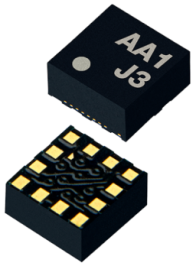C API for the kxtj3 driver.
More...
|
| | upm |
| | C++ API wrapper for the bh1749 driver.
|
| |
#include <unistd.h>
#include <signal.h>
#include "kxtj3.h"
#define SENSOR_ADDR 0x0f
#define I2C_BUS 0
#define SAMPLE_COUNT 10
bool isStopped = false;
void signal_int_handler(int signo)
{
if (signo == SIGINT)
isStopped = true;
}
{
uint8_t sample_counter = 0;
float x, y, z;
while (sample_counter < SAMPLE_COUNT && !isStopped)
{
kxtj3_get_acceleration_data(dev, &x, &y, &z);
printf("%.02f | %.02f | %.02f\n", x, y, z);
usleep(wait_time);
sample_counter++;
}
}
int main(int argc, char **argv)
{
signal(SIGINT, signal_int_handler);
printf("Sensor init\n");
if (!dev)
{
printf("kxtj3_init() failed.\n");
return -1;
}
printf("Setting settings:\nODR: 25 Hz\nResolution: High\nAcceleration range: 16g with 14bits");
kxtj3_sensor_init(dev, KXTJ3_ODR_25, HIGH_RES, KXTJ3_RANGE_16G_14);
printf("Showing acceleration data:\n");
print_acceleration_data(dev);
printf("Closing sensor\n");
kxtj3_close(dev);
return 0;
}
#include <iostream>
#include <iomanip>
#include <unistd.h>
#include <signal.h>
#include "kxtj3.hpp"
#include "upm_utilities.h"
#define SENSOR_ADDR 0x0f
#define I2C_BUS 0
#define SAMPLE_COUNT 10
bool isStopped = false;
void signal_int_handler(int signo)
{
if (signo == SIGINT)
isStopped = true;
}
{
int sample_counter = SAMPLE_COUNT;
std::vector<float> xyz;
while ((sample_counter-- > 0) && !isStopped)
{
std::cout << std::fixed << std::setprecision(3)
<< xyz[0] << " | " << xyz[1] << " | " << xyz[2] << std::endl;
upm_delay_us(wait_time);
}
}
int main(int argc, char **argv)
{
signal(SIGINT, signal_int_handler);
std::cout << "Sensor init" << std::endl;
std::cout << "Setting settings:\nODR: 25 Hz\nResolution: "
<< "High\nAcceleration range: 16g with 14bits" << std::endl;
dev.
SensorInit(KXTJ3_ODR_25, HIGH_RES, KXTJ3_RANGE_16G_14);
std::cout << "Showing acceleration data:" << std::endl;
print_acceleration_data(dev);
std::cout << "Closing sensor" << std::endl;
return 0;
}
| #define SECOND_IN_MICRO_S 1000000 |
- ID: kxtj3
- Name: tri-axis accelerometer
- Category: accelerometer
- Manufacturer: Kionix
- Connection: i2c


 1.8.11
1.8.11